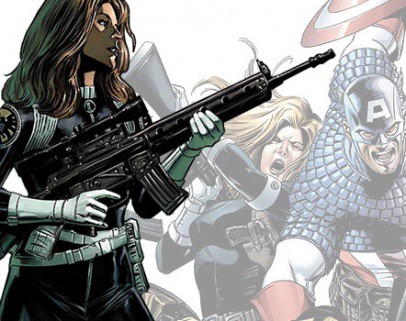One of the big would-be stories this week was the announcement of five actresses apparently on the ‘short list’ to play Sharon Carter in Captain America: The Winter Soldier. Such stories are always big news in the blogsphere, mainly because it allows bloggers to write a handful of sentences and then decorate their site with various pictures of attractive women.
What’s amusing/disconcerting about these stories is how pretty much every single website describes this role as ‘the love interest’ or ‘the romantic interest’. Most of the sites can’t even muster a token ‘female lead’, opting to describe the role as Steve Roger’s “arm candy”. Look, barring some inexplicable surprise, we all know that one of the five actresses in the running (Emilia Clarke, Jessica Brown-Findlay Teresa Palmer, Imogen Poots, and Alison Brie) is likely playing Shield agent Sharon Carter, distant relative (grand-daughter/great-niece, etc.) of Hayley Atwell’s Peggy Carter in the last Captain America film.
She has a name, she has a character and a history that can be referred to when discussing this casting news. How about we use some of that information instead of just referring to her as Steve Roger’s newest sexy time partner?
Even if we don’t want to presume that the new female lead in Captain America 2 is Sharon Carter, would it kill these websites to show a little tact as opposed to all-but-slobbering all over the various would-be contenders? It’s just another symptom of how we discuss actresses and the characters they play as pieces of meat first and characters second. It’s the same thing a discussing Rebecca Hall’s Iron Man 3 character as ‘a sexy scientist’ or titling the Gwen Stacey press release as “Spidey gets his girl”, reaffirming a culture which values women primarily as sexual objects and/or possessions of the men they stand behind. We don’t see press releases proclaiming Robert Pattinson being cast as Kristen Stewart’s love interest in Twilight or Josh Hutcherson and Liam Hemsworth as Jennifer Lawrence’s dueling romantic squeezes in The Hunger Games, now do we? It may be a minor nitpick, but it’s a symptom of a much larger issue.
_____________________________________________________
Scott Mendelson writes at Mendelson’s Memos. You can follow him on Twitter @ScottMendelson.







